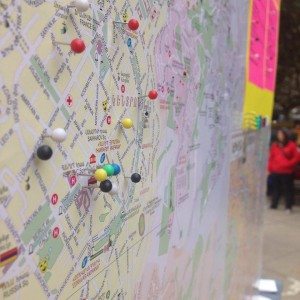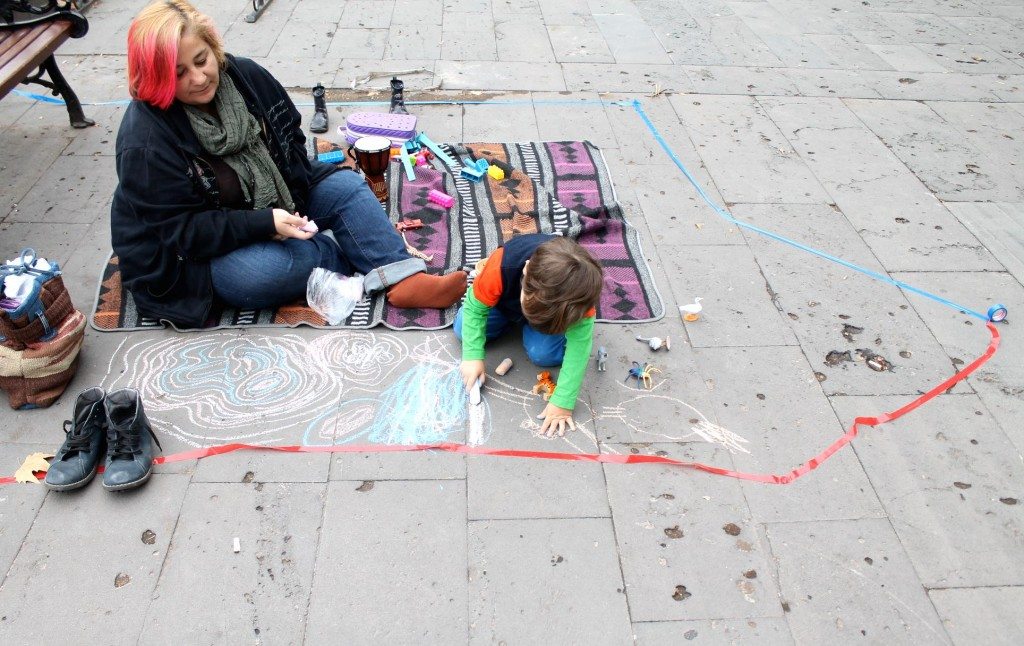Special for the Armenian Weekly
On Aug. 4, a group of activists from the Women’s Resource Center (WRC) in Armenia formed the Facebook group “Art + Activism”(see www.facebook.com/ArtActArmenia/info). Best known for their cheeky cartoons and posters on Facebook, they have until recently operated primarily via social media. An international forum called “Free Space” (click here), which took place Oct. 17-19, witnessed their growing expansion outside the digital realm.

An example of some of the cheeky feminist propaganda ‘Art + Activism’ that has been gaining notoriety via social media outlets, like Facebook.
The Art + Activism group is guided by the belief that art is not merely a byproduct of politics, but “a force to make things happen” and “a tool for reaction and action.” Thus, instead of asking “somewhat tiresome questions,” like “What is art?” or “Is this art?” Art + Activism believes that Armenia, and society in general, would be better off asking, “What can art do?” The group’s refreshing rejection of tradition makes them a valuable addition to Armenia’s activist scene.
On the last day of “Free Space,” the topic of which was the “Democratization of Space and Empowerment of Women,” Art + Activism organizers performed an experiment: They asked female members of the audience to walk from one side of the lecture area to the other if they had ever experienced any of the following unwanted interactions from a man on the streets in Yerevan: staring, stalking (by foot or car), inappropriate dialogue, or any other form of harassment. The shuffling of feet that ensued was astonishing.
Street harassment is an enormous problem in Yerevan and stems largely from an entitlement over public space that men naturally feel in a patriarchal society. Despite the severity of the issue, progress in implementing policies and laws to protect women from the threat of harassment is, for bureaucratic reasons, slow-moving.
Art + Activism has overcome this obstacle by creatively combining action with interaction in their latest project: an interactive crowd map called “Mi Lrir” (Don’t Be Silent).

Organizers prepared business card-sized documents beforehand that allowed women to communicate their right to privacy without having to utter a word. This new strategy could be ground-breaking in Yerevan’s community, particularly for women whose language skills limit their ability to express themselves clearly and assertively to locals. In red, it says, “Please do not disturb me or speak with me,” and directs offenders to Mi Lrir’s website.
The concept for Mi Lrir is an incredible example of creative problem-solving. It documents in real-time from real women what is really happening on Yerevan’s streets. Elizabeth McFadden, a member of Art + Activism living in Yerevan, says Mi Lrir was inspired by a similar project in Syria called Women Under Siege (click here).

Mi Lrir is an online interactive map, but for the Free Space demonstration, organizers brought with them a physical map and asked women to indicate locations of harassment.
An interactive map (see https://milrir.crowdmap.com) tracks incidents of harassment on the streets by allowing women to place “pins” on locations where real harassment of some kind has happened to them.
The severity and degree of harassment is indicated by different colors; for example, a purple pin refers to harassment that took place on the street, while a blue one indicates it happened from a vehicle.
During the forum, organizers provided a real map to introduce the concept to the audience, and allowed them to begin indicating their experiences at the forum, which would later be uploaded to the website. The project has only been active for a few days and has already had 24 stories uploaded by women in the community.

Participants of the forum engaged in the ‘Respect My Space’ creative demonstration. Women were given a roll of tape and instructed to designate and ‘activate’ their personal space, which no one else could enter without their permission or instruction.
Following the introduction of Mi Lrir, organizers allowed participants to engage in an empowering creative activity they called, “Respect My Space,” which emphasized n a very literal way a woman’s right to not have her space invaded by outsiders.
In plain view, on Mashtots Avenue at the entrance to the park, each woman was given a roll of colored tape to mark her personal space wherever and however she deemed appropriate. In this space, she was free to do whatever she wished, anything from practicing yoga to writing an e-mail.

The public nature of the demonstration aroused curiosity from passersby, who were provided with the Mi Lrir cards.
If approached, even if out of sheer curiosity, participants were instructed to respond, “Yes chem uzum khosel, harkek im taratskuh” (“I don’t want to talk, please respect my space”). Outsiders were not entitled to enter participants’ space unless given permission to do so. The activity gave women in Yerevan’s community permission to practice assertion and solidarity.
Photos by Tarverdi Photography.
The post Activating Awareness Through Alternative Art in Armenia appeared first on Armenian Weekly.
